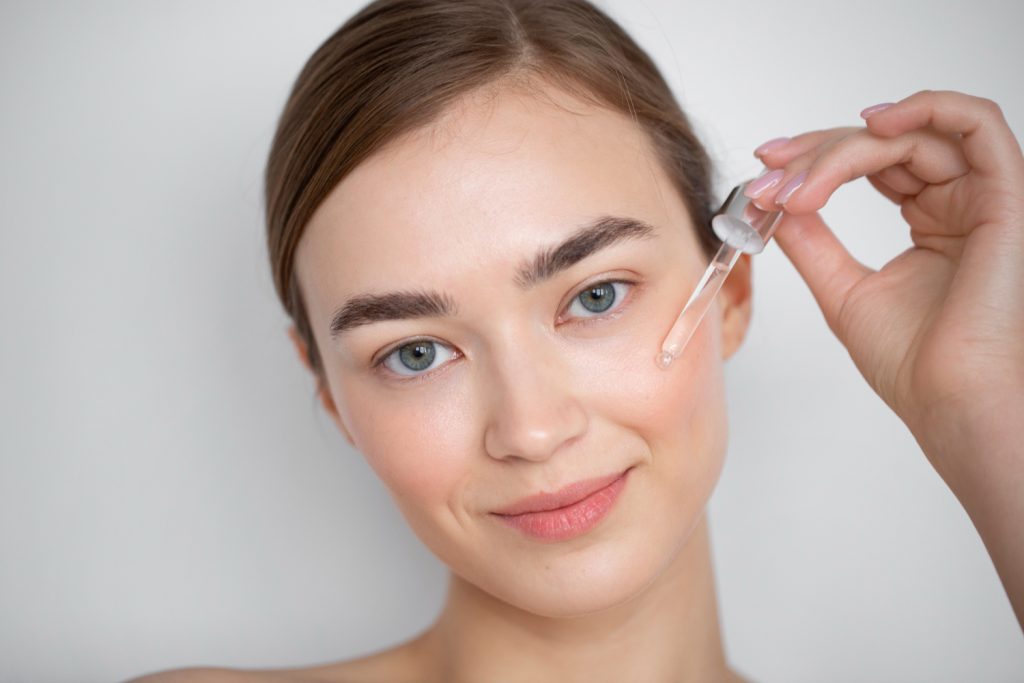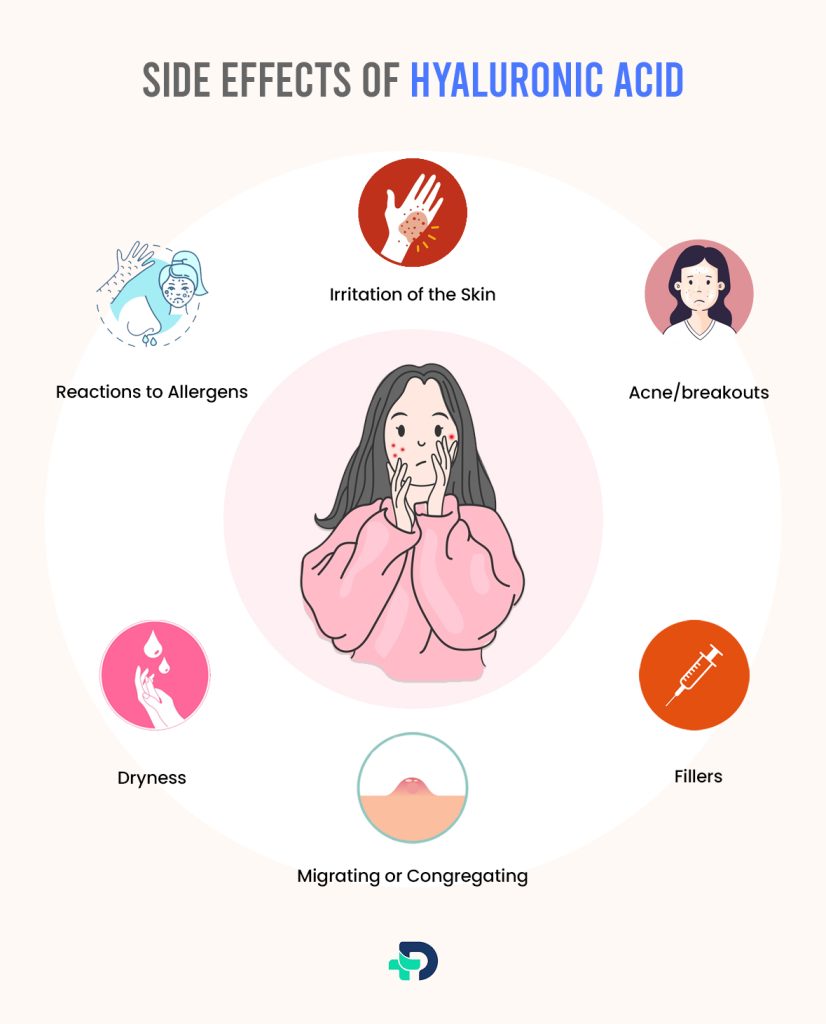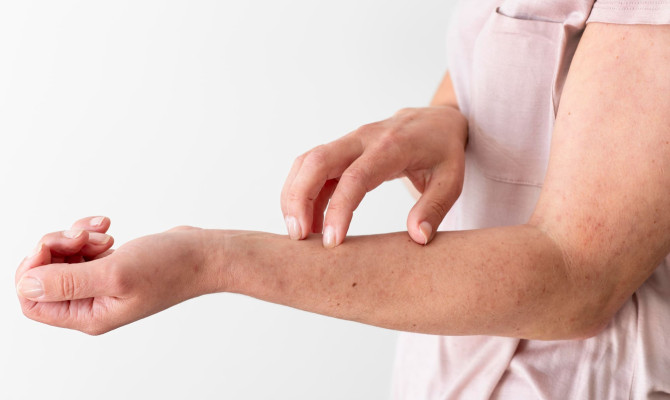Can Hyaluronic Acid Cause Acne

- Acne
- 28 Sep 2023
Overview
Acne & Hyaluronic Acid
Although acne is a common skin condition, it may be frustrating since its root cause is not always clear. Hyaluronic acid (HA) has been the subject of increasing speculation as a possible trigger.
Acne is one of the most common skin care issues that bothers individuals of all ages. The appropriate treatment for those annoying bumps and blemishes will make a great impact, and you certainly don’t want any of your skincare products to exacerbate your acne.

And now, does hyaluronic acid cause acne? No, in a nutshell, it does not. That’s a fantastic fact since hyaluronic acid is very useful for all skin types. Your skin will be firmer, more even in tone, and better able to take in the rest of your regular skincare regimen.
Hyaluronic acid (HA) is a popular component of many skin care formulations. The term “acid” in the title, together with the word “hyaluronic,” may give you the creeps. But you need not worry. This article will explain what hyaluronic acid is and who should (and should not) take it.
Hyaluronic Acid
What is Hyaluronic Acid?
Hyaluronic acid is a humectant 1 Hyaluronic Acid | Researched based study from National Institutes of Health , which is a substance that can hold water on the skin. It’s a part of what our skin makes naturally, which is one reason why it works well for all skin types and is so well accepted.
It is found all over the body, but it is especially helpful in cleaning the eyes, joints, and connective tissue. It keeps the body running smoothly and is even used to treat pain and swelling in the joints. You can take hyaluronic acid in a few different ways, like as a pill or by putting it on your skin. You can also get hyaluronic acid filler, which is hyaluronic acid injected into your body.
Hyaluronic acid comes in different forms, which is why it can be listed under different names on ingredient lists. Sodium hyaluronate is the most common example of this other way of saying things. Hyaluronic acid is the source of sodium hyaluronate.
To put it simply, sodium hyaluronate is the salt of hyaluronic acid.
About Hyaluronic Acid:
Hyaluronic acid can be found with different amounts of molecules. Sodium hyaluronate has a smaller molecular weight and keeps the skin wet and hydrated for a long time. As the chemical weight goes up, the effects become more noticeable, but they don’t last as long.
It is gentle on the skin because, unlike many other famous ingredients like Retinol or Vitamin C, it doesn’t damage or over-dry the skin. HA comes in many different kinds of products, such as serum, creams, lotions, and even masks. When you put HA on your skin, it keeps it looking young and reduces redness caused by allergies or itching.
What’s the Difference between Hyaluronic Acid with a High, Medium, or Low Molecular Weight?
The size of the molecules in high, medium, and low molecular weight hyaluronic acid makes them all different. The difference in size affects how deep the hyaluronic acid goes into the skin and what effects it gives.
- High Molecular Weight Hyaluronic Acid (HMW-HA): This type of hyaluronic acid has molecules that are bigger and don’t go deep into the skin. Instead, they sit on the surface of the skin. This size makes hydration shields and seals in moisture to keep water from escaping. This type is used for quick, short-term effects and to keep the skin’s surface moist.
- Medium Molecular Weight Hyaluronic Acid: It is the middle type of hyaluronic acid because it is smaller than HMQ-HA but bigger than LMV-HA. This helps it reach the middle layers of the skin.
- Low Molecular Weight Hyaluronic Acid (LMW-HA): Since it is the smallest, LMW-HA can get into the skin’s inner layers and hydrate it from the inside. By getting to lower layers of the skin, it can help spur the production of collagen, which is good for the suppleness of the skin. This form is used more for anti-aging effects that last longer.
Benefits
Benefits of Hyaluronic Acid:
The human body contains hyaluronic acid naturally; it is most abundant in the skin, connective tissues, and eyes. For the same reasons, it is often found in cosmetics and skincare products. Some of hyaluronic acid’s advantages are as follows:
Hydration of the Skin:
- Hyaluronic acid’s primary value lies in its capacity to bind and store water. Its high water-retention capacity 2 Benefits | Researched based study from National Institutes of Health makes it an effective skin moisturizer. Because of this, the skin stays hydrated and looks fresher for longer.
Moisturisation:
- Hyaluronic acid’s capacity to retain moisture is important for preserving skin elasticity and suppleness, making it a key ingredient in anti-aging treatments.
- Natural hyaluronic acid synthesis declines with age, leaving skin drier and less resilient. To reduce the visibility of wrinkles and fine lines, try using products with hyaluronic acid.
Healing Wounds:
- Hyaluronic acid helps wounds heal by facilitating cell migration and repair of damaged tissues. It helps wounds heal faster and hides scars by maintaining a moist environment.
Joint Health:
- Hyaluronic acid serves as a lubricant and shock absorber in joint fluid, in addition to its beneficial effects on the skin. Hyaluronic acid is used in certain joint supplements and injections to assist reduce the pain and swelling associated with osteoarthritis.
Volume of the Eyes & Lips:
- Lip enhancement or filling and under-eye hollow filling both benefit from the use of hyaluronic acid in cosmetic operations. A brief plumping effect, lasting up to a few months, is achieved after injection.
Anti-inflammatory & calming:
- Those who suffer from sensitive or irritated skin may find relief from hyaluronic acid’s calming and anti-inflammatory effects. It is soothing to the skin and helps minimize redness.
Ideal for Normal to Oily Skin:
- Even oily and acne-prone skin may accept hyaluronic acid without any adverse reactions. It’s a hydrating component that won’t leave your skin feeling oily or weighed down, and it won’t clog your pores.
Improved Texture:
- Hyaluronic acid, when used regularly, may result in a smoother complexion and enhanced skin texture. It aids in restoring the skin’s natural moisture balance, which in turn promotes a more uniform and healthy glow.
Sunburn Remedy:
- Hyaluronic acid’s cooling and moisturizing effects on burnt skin are welcome. The sunburn pain may be relieved by its hydrating capabilities.
Hyaluronic acid’s moisture-retaining properties give long-lasting hydration, making it a great compliment to skincare regimen, particularly for those with dry skin. While hyaluronic acid has several potential applications, the formulation and concentration of skincare products may affect how well they work. Before using a new product on your skin, always do a patch test, and think about seeing a dermatologist for tailored guidance.
Is it okay to Use Hyaluronic Acid on Your Face Every day?
- Hyaluronic acid is typically safe for everyday usage on the face. Hyaluronic acid gives moisture to the skin and is generally well-tolerated because of its mild nature. Hyaluronic acid should be a part of everyone’s daily skincare regimen since it helps keep skin hydrated, enhances skin texture, and promotes a glowing complexion.
Disadvantages
Does Hyaluronic Acid have Any Disadvantages?
Hyaluronic acid is typically well-tolerated and seen to be safe for most individuals, although there are some possible drawbacks and things to think about.
Impacts on the Short-Term:
- When used topically or injected, hyaluronic acid gives transient advantages. Its benefits are not long-lasting, therefore continued use or periodic touch-ups may be required.
Dryness in Low Humidity:
- Hyaluronic acid may cause greater dryness if it absorbs water from the skin rather than the air under low-humidity conditions. Hyaluronic acid products work best when applied to wet skin and then sealed with a moisturizer to keep the moisture in.
Allergy:
- Rarely, some people may have responses to hyaluronic acid products that include irritation, redness, or an allergic reaction. You may find out whether you have an allergy to a product’s substance by doing a patch test beforehand.
Injected Applications:
- Dermal fillers ,3 Dermal Fillers | Researched based study from Harvard Health Publishing which are used in cosmetic operations, may cause unwanted side effects including bruising, edema, and infection. It is essential that these operations be carried out by trained experts.
Cost Estimate:
- Some high-quality hyaluronic acid solutions, especially those with unique or complex formulas or delivery mechanisms, might be on the pricey side. Those who are trying to save money may want to think about this.
Not good for Wrinkles :
- Some wrinkles and lines may respond well to hyaluronic acid fillers, however this treatment may not be appropriate for other skin issues. Botox and other alternative therapies may be necessary for deep wrinkles or those induced by the contraction of muscles.
Impacts that Wear Off Quickly in Some Applications:
- Results from cosmetic hyaluronic acid injections may not always endure as long as hoped, necessitating repeat procedures.
Before adding hyaluronic acid to your skincare regimen, it’s important to think about your unique skin type, issues, and allergy history. Consult a skincare specialist for individualized guidance and suggestions before using hyaluronic acid or any other skincare component.
Side Effects

Side Effects of Hyaluronic Acid:
When used topically, such as in skincare products, hyaluronic acid is typically well-tolerated and safe for most individuals. There is a small risk of adverse effects 2 Side Effects | Researched based study from National Institutes of Health , although they are uncommon. Some recorded adverse effects include the following:
Irritation of the Skin:
- Products containing hyaluronic acid have been linked to minor irritation, redness, and itching in some users. This is more likely to happen to persons who already have sensitive skin or who are using really concentrated hyaluronic acid solutions.
Reactions to Allergens:
- Hyaluronic acid allergies are very unusual but do happen. Redness, itching, swelling, and a rash are all possible signs of an allergic response. Stop using the product and see a doctor if you think you’re having an allergic reaction.
Acne/breakouts:
- People who already have very acne-prone skin may see a worsening of their condition after utilizing hyaluronic acid. The skin’s higher moisture levels may be to blame for this.
Dryness:
- Hyaluronic acid may be able to pull moisture from the skin if it is not adequately sealed with a moisturizer in very dry or low-humidity situations. This might cause some transient dryness or a constricted sensation.
Fillers:
- Side effects of injectable hyaluronic acid for dermal fillers include bruising, swelling, redness, discomfort, and, in very rare circumstances, infection. These are normally transitory and go away on their own.
Migrating or Congregating:
- Hyaluronic acid fillers administered for aesthetic reasons have been linked to rare instances of lump formation or migration from the injection site. In certain cases, a doctor or other medical practitioner may fix these problems.
The skin’s natural moisture balance may be disrupted by using hyaluronic acid products too often, which can have the reverse effect of increasing dryness. This is more likely to happen when large doses of hyaluronic acid are used in the absence of sufficient water and oil.
Many of these adverse effects are uncommon and might be attributed to insufficient dosing, hypersensitivity to the active component, or certain formulations.
Before using hyaluronic acid products all over your face, it is recommended that you do a patch test on a small area of skin. Stop using and see a dermatologist or other medical expert if you have any negative effects. The potential for adverse effects from cosmetic hyaluronic acid injections may be reduced by working with a knowledgeable and competent healthcare professional.
Instructions
Hyaluronic Acid: How To Use It?
Hyaluronic acid has several positive effects on the skin 2 How to use | Researched based study from National Institutes of Health , including providing moisture. The best way to integrate hyaluronic acid into your daily regimen is described below.
- Cleaning: To begin, wash your face with a mild cleanser to remove any makeup, grime, or other pollutants. This prepares your skin for further treatment.
- Tone : If you use a toner, do it after you’ve washed your face. The skin’s pH may be restored with the aid of a toner, making it ready for the next treatments.
- Serum: Hyaluronic acid serums and essences should be used after cleaning (and toning, if necessary). The most common forms for these items are liquids and gels. A little amount should be applied to the fingers and then patted or pressed into a moist face and neck. Hyaluronic acid is enhanced in its capacity to retain water by the presence of moisture.
- Retain Humidity: After using hyaluronic acid, use a moisturizer very afterwards to prevent your skin from drying out. Select a moisturizer that works well with your skin.
- Apply sunscreen: Applying a broad-spectrum sunscreen with at least SPF 30 as the last step of your morning skincare regimen is highly recommended. Sunscreen is crucial for shielding skin from the sun’s potentially damaging UV radiation.
- Other Methods of Skin Care: Your other skincare products, such as treatments, serums, and moisturizers, may be applied as usual. You should use the hyaluronic acid product first, before any other lotions or oils, just to be safe.
- Usage: Hyaluronic acid may be used twice a day, in the morning and before bed. But see how your skin reacts to it. Use it once a day or twice a day, or as required, if you experience any irritation or dryness.
- Layering: When combined with additional moisturizing substances, hyaluronic acid really shines. It may be used in conjunction with occlusive products (such as oils or balms) and humectants (such as glycerin or aloe vera) to keep moisture in.
- Don’t Use It Too Much: While hyaluronic acid has several uses, it is possible to upset the skin’s natural moisture balance if too much of it is applied. It’s crucial to strike a balance that complements your skin’s needs.
Keep in mind that everyone has different needs when it comes to their skincare routine.
Skin
Is Hyaluronic Acid Helpful for All Skin Types, or Only Certain Ones?
Hyaluronic acid’s moisturizing and non-comedogenic (non-pore-clogging) properties make it a universally useful ingredient. Hyaluronic acid may be helpful for the following skin types:
- Dry skin: Hyaluronic acid is a great option for those with dry skin because of its ability to attract and retain moisture. It aids in restoring lost moisture and sealing it in, which in turn makes the skin less dry and flaky.
- Dehydrated Skin: Skin that is lacking in water might seem dull and have its protective barrier broken. Hyaluronic acid boosts hydration, which in turn gives skin a more supple and youthful look.
- Combination skin: Hyaluronic acid is beneficial for all skin types, including combination skin, which has both oily and dry patches. It nourishes the dry patches without adding oil to the oily ones.
- Sensitive Skin: Even the most delicate skin types often have no problems tolerating hyaluronic acid. Its calming effects may reduce redness and inflammation.
- Mature skin: Wrinkles and fine lines appear as a result of a decline in the skin’s natural hyaluronic acid synthesis, which occurs naturally with age. Hyaluronic acid has been shown to aid with skin plumping, which helps reduce the look of fine wrinkles and keep you looking younger for longer. Hyaluronic acid’s ability to combat fine lines, wrinkles, and sagging skin makes it an ideal treatment for aged skin.
- Skin Prone to Acne: Hyaluronic acid does not cause acne since it does not stick in your pores. Hyaluronic acid may be used to moisturize the skin of those prone to acne without causing or worsening the condition.
- For those with Oily Skin: Although people with oily skin may not believe they need to moisturize, hyaluronic acid has been shown to reduce excess oil production. Proper hydration prevents the skin from producing excess oil to counteract the drying effects of dehydration.
- Dull Skin: Hyaluronic acid’s capacity to enhance skin hydration may also lead to a more radiant and plump complexion, aiding in the fight against dullness.
Causes
Causes of Acne
Acne develops when sebaceous glands in the skin get blocked by sebum and dead skin cells. Acne’s root causes are multifaceted and include, but are not limited to:
- Excessive Oil Secretion: Sebaceous glands in the skin produce sebum, an oily material. An overabundance of sebum may cause pores to get blocked and foster the growth of germs.
- Dead Skin cells: Skin cells die and are replaced on a continual basis. Acne may develop when dead skin cells combine with excess sebum to block pores.
- Bacteria: Acne lesions are caused by the bacterium Propionibacterium acnes (P. acnes), a normally occurring skin resident that may get trapped in blocked pores and grow, resulting in irritation. Acne-related redness, swelling, and inflammation are caused by the immune system’s reaction to the presence of bacteria and trapped material in the pores.
- Hormones: Puberty, menstruation, pregnancy, and disorders like polycystic ovarian syndrome (PCOS) can cause hormone swings, which may trigger the sebaceous glands to generate more oil and exacerbate acne.
- Genetics: Acne tends to run in families, therefore there may be a genetic component to acquiring the illness. Factors such as sebum production and the skin’s reaction to inflammation may be heritable.
- Diet: Although research on the relationship between diet and acne is limited, some evidence suggests that high-glycemic meals (such as sugary and processed foods) and dairy products may aggravate acne in certain people.
- Skin Texture: Whiteheads, blackheads, pimples, cysts, and nodules are all potential manifestations of acne. Acne may vary in intensity from minor to severe, requiring a variety of possible treatments. Squeezing or picking at acne lesions may make the inflammation worse, cause permanent scarring, and delay the healing process.
Is Acne a Side Effect of Hyaluronic Acid?
- There is no evidence that hyaluronic acid contributes to acne. Hyaluronic acid is non-comedogenic, meaning it won’t clog pores and cause zits, and is widely believed to be safe for use. Because of its ability to hydrate and refine the skin’s texture, it’s a popular ingredient in skincare products for people of all skin types, including those prone to acne.
- Individuals may respond differently to skincare products. Some individuals may experience skin irritation or breakouts if they use products containing hyaluronic acid because of sensitivities or allergies to the ingredient. Hyaluronic acid may exacerbate acne if it is combined with comedogenic or irritating substances in a product’s formulation.
If you’re taking a Hyaluronic Acid product and are worried about acne or breakouts, you should follow these guidelines.
- The Patch Test: Do a little patch test to evaluate how your skin responds to a new product before using it all over your face. Doing so might help you check for any allergic responses before applying the product all over your face.
- Check the content: Keep an eye out for comedogenic and irritating substances that might aggravate acne. Products containing substances you know triggered acne outbreaks in the past should be avoided.
- Roll Out New Products: You should ease into using a new skincare product, such one containing hyaluronic acid, on your skin. Use it every other day or once or twice a week at first, and if your skin tolerates it, use it every day.
- Keep an Eye on Your Skin: After using the product for a few weeks, pay close attention to how your skin reacts. You should stop using the product and see a dermatologist if your acne or other symptoms worsen while using it.
Hyaluronic acid has been shown to be effective for many different kinds of skin, including acne-prone skin, and is generally well tolerated. However, since everyone’s skin is different, it’s vital to pay attention to your own skin and make any necessary adjustments to your skincare regimen.
Forms Of Acne
When it comes to Hyaluronic Acid, What are the Various Forms of Acne?
Although hyaluronic acid is not often considered a causative factor in acne, it has been shown to be helpful in the treatment of certain forms of acne and other skin problems. Hyaluronic acid may be helpful for the following forms of acne:
Inflammatory Acne:
- Pimples, pustules, nodules, and cysts are all types of inflammatory acne. While hyaluronic acid alone won’t clear up inflamed acne, it may be used in conjunction with other skincare products to keep skin supple and healthy. Inflammatory acne may be made worse by dryness and irritation, although these issues are less likely to occur on hydrated skin.
Non inflammatory acne:
- Whiteheads and blackheads are examples of non-inflammatory acne. Using hyaluronic acid as part of your regimen may not prevent various forms of acne, but it will help keep your skin hydrated and in good condition.
Acne scarring:
- Acne scars may be either depressed (atrophic) or elevated (hypertrophic) and form after the lesions heal. Dermatologists may occasionally employ hyaluronic acid fillers on atrophic acne scars. Fillers like these may temporarily enhance the look of these scars by adding volume to the skin around them.
Treatment-Related Dry Skin in People with Acne:
- The active components in several acne treatments, such as benzoyl peroxide or retinoids, may dry up and irritate the skin. In conjunction with these remedies, hyaluronic acid may help restore moisture to the skin and prevent further dryness.
Post-Inflammatory Hyperpigmentation (PIH):
- Post-inflammatory hyperpigmentation is the darkening of the skin that acne scars leave behind after they heal. While hyaluronic acid cannot cure PIH, it may aid the skin in its natural healing processes, which in turn may reduce the appearance of PIH over time.
Acne Treatments Containing Hyaluronic Acid:
- Hyaluronic acid-containing skincare products with acne-fighting chemicals are available, although hyaluronic acid is not a form of acne. Acne treatment and hydration are combined in these products. However, everyone’s skin reacts differently, so keep an eye on it.
Based on your skin’s demands, the severity of your acne, and the kind of acne you have, they may offer effective therapies.
FAQs
Hyaluronic Acid & Acne – FAQs
Is Hyaluronic Acid Comedogenic?
- Hyaluronic acid won’t block your pores or produce acne on its own. However, not all hyaluronic acid products are appropriate for oily or acne-prone skin.
- If you have oily skin, you should carefully read the label to make sure there are no comedogenic substances in the product. Read on for a simple guide to help you identify potentially comedogenic chemicals in hyaluronic acid moisturizers and serums.
When it comes to Acne, should Hyaluronic Acid be used?
- Hyaluronic acid is a non-comedogenic and non-exfoliating acid that may help acne sufferers’ skin retain moisture and recover. Look for comedogenic substances on the label of your new hyaluronic skin care product if you’re getting breakouts.
- You might be overusing hyaluronic acid if a comedogenic skincare product is still causing pimples. Hyaluronic acid, when used properly, may help the skin keep its natural moisture, smooth fine wrinkles and scars, and give the face a dewy, plump appearance.
Why do I break out in Acne after using Hyaluronic Acid?
There are a few potential explanations for why you could break out after using hyaluronic acid products, despite the fact that hyaluronic acid is typically non-comedogenic and unlikely to cause acne:
- Blocked Pores: It’s possible that certain hyaluronic acid treatments include emollients or occlusives, which might clog pores and cause acne in those who are already prone to outbreaks. It is important to read labels and choose items that are “non-comedogenic.”
- Interactions with Products: Hyaluronic acid may cause breakouts if used in conjunction with other skincare products due to the possibility of chemical interactions. It’s possible that your skin’s pores may get blocked if you use a product combination that’s too thick or occlusive for it.
- The Dangers of Overhydration: The skin’s natural moisture balance might be disrupted and lead to an overproduction of oil if too much hyaluronic acid products are used or if they are layered too thickly. Possible cause of acne outbreaks.
- Initial Adaptation: There may be an adjustment phase when incorporating a new skincare product into your regimen, particularly if your skin is not used to the ingredient or formulation. Sometimes this causes short-term skin problems.
- Other Factors: Alterations to your nutrition, stress levels, hormone fluctuations, or environmental irritants may all play a role in your acne outbreaks.
Tips
Tips to Use Hyaluronic Acid to Avoid Acne/Breakouts
Some advice on how to include Hyaluronic Acid into your Beauty Routine:
- Clean Skin: To maximize its absorption and efficiency, hyaluronic acid should be applied to freshly washed skin.
- Use on wet Skin: Applying hyaluronic acid to wet skin maximizes its effectiveness. After washing your face, wipe it dry with a towel, but don’t rub it too hard. This aids hyaluronic acid’s capacity to hydrate by allowing it to attract and hold onto water molecules.
- Patch Test: A patch test should be done on a small area of skin before applying hyaluronic acid all over the face to rule out the possibility of an allergic response.
- Layering: Hyaluronic acid should be used after cleaning and toning, but before heavier creams or oils. Because of this, it is able to efficiently permeate the skin without encountering any resistance.
- Apply a small Pinch: When it comes to hyaluronic acid, a little goes a long way. Use only a little bit at first—a drop the size of a pea—and pat it all over your face.
- Apply gently: Applying hyaluronic acid should be done gently; no rubbing or pulling the skin should be done. Instead, massage and push gently to assist the substance absorb.
- Moisturize: Use a moisturizer after applying hyaluronic acid to keep your skin hydrated for longer. This forms a barrier that blocks the evaporation of moisture.
- Sunscreen: Protect your skin from the sun after using hyaluronic acid in the morning by applying a broad-spectrum sunscreen with at least 30 SPF.
- Climate Adjustments: Hyaluronic acid usage may need to be adjusted based on environmental factors like temperature and humidity. If you live in a dry climate, you may want to use a heavier moisturizer on top of the hyaluronic acid.
- Regular Use: Hyaluronic acid’s advantages are seen with continued use. To get its full benefits, it should become an integral part of your daily routine.
- Combining with Other Hydrating Ingredients: Combinations including hyaluronic acid and additional humectants, such as glycerin, ceramides, and natural oils, may be very effective.
Conclusion
Hyaluronic Acid – Caution is Required
Hyaluronic acid (HA) 4 Conclusion | Researched based study from National Institutes of Health is a common component in anti-aging and anti-inflammatory skincare products. It works by attracting and retaining moisture in the skin. There are no known adverse effects, therefore it is safe for most individuals to use.
However, since it may promote activity beneath the skin, it may irritate the skin in some individuals or make acne worse in others.
Acne-prone individuals should take hyaluronic acid with caution, as it may aggravate their condition. Overall, if you have any doubts about whether or not hyaluronic acid is appropriate for your skin, it is advisable to see a dermatologist to obtain individualized guidance and a treatment plan.
Any feedback on this article?
 This Articles content was accurate
This Articles content was accurate Very Informative Article
Very Informative Article I have a question or a comment
I have a question or a comment
 This article contains inaccurate content
This article contains inaccurate content This article was not helpful
This article was not helpful I have a question or a comment
I have a question or a comment
We appreciate your helpful feedback!
Checkout our social pages
References
-
National Institutes of Health
Hyaluronic Acid
-
National Institutes of Health
Benefits | Side effects | How to use
-
Harvard Health Publishing
Dermal fillers
-
National Institutes of Health
Conclusion




































